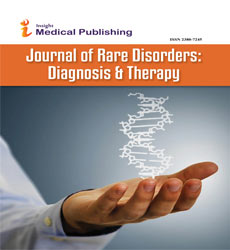Lesch-Nyhan Syndrome
Managing Editor, Journal of Rare Disorders: Diagnosis & Therapy, United Kingdom, E-mail: raredisorders@medicineinsights.com
Editorial
Lesch-Nyhan syndrome (LNS) is a rare and a genetic disorder of purine metabolism characterized by the deficiency of the enzyme hypoxanthine-guanine phosphoribosyltransferase (HPRT). It is associated with 3 major clinical elements: overproduction of uric acid, neurologic disability, and behavioral problems. Purines are nitrogen-containing compounds found in many foods. Uric acid production is due to deficient recycling and enhanced synthesis of purine bases.
Uric acid levels are abnormally high in people with Lesch-Nyhan syndrome; excess uric acid can be released from the blood and build up under the skin and cause gouty arthritis. This can cause sodium urate crystals to form in the joints, kidneys, central nervous system, and other tissues of the body.
This condition is inherited in an X-linked recessive pattern, with rare female exceptions, most often affects males. It is approximately 1 in 380,000 individuals. Mutations in the HPRT1 gene cause Lesch-Nyhan syndrome that is located on the X chromosome.
The symptoms includes: gouty arthritis, kidney and bladder stones, hemiplegia, hyperuricemia, neurological symptoms (facial grimacing, involuntary writhing, and repetitive movements of the arms and legs), behavioral disturbances, abnormal involuntary muscle movements such as tensing of various muscles, jerking movements, flailing of the limbs, unable to walk and self-injurious behaviour etc. Diagnosis is suspected when psychomotor delay occurs in a patient with elevated uric acid in blood and urine. Molecular genetic testing confirms the diagnosis. Uric acid overproduction is managed with allopurinol, urine alkalinization, and hydration. In, Lesch-Nyhan syndrome the drug allopurinol is used to control the excessive amounts of uric acid and control symptoms associated with excessive amounts of uric acid. There is no standard treatment for neurological or behavioral symptoms associated with this disorder. When kidney stones are present, they may be treated with may be treated with lithotripsy.
Self-injury requires physical restraints, behavioral and pharmaceutical treatment. Genetic counseling is recommended.
References
- https://ghr.nlm.nih.gov/condition/lesch-nyhan-syndrome
- https://rarediseases.org/rare-diseases/lesch-nyhan-syndrome/
- https://emedicine.medscape.com/article/1181356-overview
- https://www.orpha.net/consor/cgi-bin/OC_Exp.php?Lng=GB&Expert=510
- https://www.brainfacts.org/diseases-and-disorders/neurological-disorders-az/diseases-a-to-z-from-ninds/lesch-nyhan-syndrome
- https://rarediseases.info.nih.gov/diseases/7226/lesch-nyhan-syndrome#:~:text=LeschNyhansyndromestonesandmoderatecognitivedisability.
Open Access Journals
- Aquaculture & Veterinary Science
- Chemistry & Chemical Sciences
- Clinical Sciences
- Engineering
- General Science
- Genetics & Molecular Biology
- Health Care & Nursing
- Immunology & Microbiology
- Materials Science
- Mathematics & Physics
- Medical Sciences
- Neurology & Psychiatry
- Oncology & Cancer Science
- Pharmaceutical Sciences
